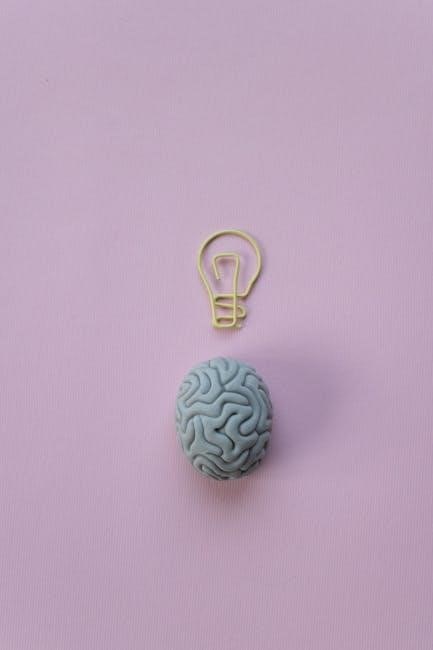The book explores how well-intentioned but harmful ideas are shaping a generation, emphasizing the decline of free speech and rising mental health challenges on campuses.
Overview of the Book and Its Authors
The Coddling of the American Mind is a thought-provoking book co-authored by Greg Lukianoff, a First Amendment expert, and Jonathan Haidt, a renowned social psychologist. Published in 2018 by Penguin Press, the book examines the cultural and social trends that have shaped the mental and emotional well-being of American youth. Lukianoff and Haidt explore how well-intentioned but misguided ideas have contributed to rising anxiety, polarization, and the erosion of free speech on college campuses; Drawing on decades of research, they trace these issues back to the 1980s, highlighting the decline of unsupervised play, the rise of social media, and increasing political polarization. The authors argue that these factors have created a generation unprepared for the challenges of adulthood and open discourse.
The Main Thesis: How Good Intentions and Bad Ideas Shape a Generation

The book’s central argument is that well-meaning but misguided ideas have profoundly impacted American youth, leading to unintended negative consequences. Authors Greg Lukianoff and Jonathan Haidt identify three “Great Untruths” that have become deeply ingrained in modern culture: What doesn’t kill you makes you weaker, Always trust your feelings, and Life is a battle between good people and evil people. These ideas, though rooted in good intentions, have fostered a generation marked by heightened anxiety, intolerance of differing viewpoints, and a diminished capacity for resilience. The authors contend that these untruths have been perpetuated by changes in parenting, education, and social media, ultimately undermining the intellectual and emotional development of young people.

The Three Great Untruths
The book identifies three harmful ideas shaping young minds: fragility, emotional certainty, and moral polarization, which hinder resilience and open-mindedness.
What Doesn’t Kill You Makes You Weaker
This untruth suggests that challenges and hardships weaken individuals rather than strengthen them. The belief fosters fragility, as students increasingly avoid discomfort, fearing it may harm them. Authors argue that such avoidance prevents personal growth and resilience, essential for overcoming life’s obstacles. By shielding young people from adversity, society undermines their ability to cope with stress and adapt to changing circumstances. This mindset contrasts with the traditional notion that overcoming difficulties builds character and mental toughness. The book highlights how this belief has infiltrated education, leading to overprotection and limiting students’ opportunities to develop resilience through experience.
Always Trust Your Feelings
This second untruth emphasizes the idea that emotions should always guide decision-making and interpretation of events. Authors Lukianoff and Haidt argue that this mindset fosters emotional reasoning, where feelings are prioritized over facts and logic. Students are encouraged to believe that their emotions are infallible, leading to oversensitivity and an inability to critically evaluate opposing viewpoints. This untruth contributes to a culture of outrage, where discomfort is often mistaken for harm. By trusting feelings without question, individuals lose the ability to distinguish between valid concerns and irrational anxieties. The book highlights how this mindset exacerbates polarization and hinders constructive dialogue, as emotions often cloud objective analysis and hinder personal growth. The authors stress the importance of balancing emotions with reason to foster resilience and intellectual humility. This untruth, combined with the others, creates a cycle of fragility and intolerance.
Life Is a Battle Between Good People and Evil People
This third untruth posits that the world is divided into morally superior individuals and malevolent oppressors. Lukianoff and Haidt argue that this binary thinking fosters a culture of Us vs. Them, where students perceive opposing views as existential threats rather than opportunities for dialogue. This mindset discourages empathy and understanding, as individuals categorize others as entirely good or evil. The authors link this untruth to the rise of intolerance and ideological polarization on campuses, where dissent is often met with hostility. By framing life as a constant battle, this untruth undermines the ability to engage in constructive debate and fosters a victimhood culture. It also discourages students from exploring nuanced perspectives, leading to a narrow, dogmatic worldview. This untruth, combined with the others, creates a society where division and outrage prevail over open-mindedness and cooperation.

The Impact of Social Trends on American Youth
Rising overprotection, social media dominance, and political polarization have reshaped American youth’s experiences, influencing mental health and worldviews in profound, often unintended ways.
The Decline of Unscheduled Play and the Rise of Overprotection
The decline of unscheduled play has led to increased overprotection of children, limiting their ability to develop resilience and problem-solving skills. This shift, beginning in the 1980s, has been driven by parental fears and societal pressures, resulting in a generation less equipped to handle challenges independently. Overprotection often stifles creativity and adaptability, as children are deprived of opportunities to navigate risks and learn from failures. This trend has significant implications for mental health, as lack of autonomy can contribute to anxiety and diminished confidence. The rise of structured activities and constant adult supervision has further exacerbated this issue, creating a culture where children are shielded from essential life experiences. Consequently, this overprotection has hindered the development of emotional and psychological resilience, leaving many young people unprepared for the complexities of adulthood.
The Role of Social Media in Shaping Campus Culture
Social media has profoundly influenced campus culture, amplifying student voices but also fostering echo chambers and polarization. Platforms like Twitter and Instagram allow students to share their experiences and mobilize around causes quickly, creating a sense of community and solidarity. However, this has also led to the spread of misinformation and the amplification of outrage, often resulting in the suppression of diverse viewpoints. The constant exposure to curated and often extreme content can heighten anxiety and create a culture of performative activism, where online personas sometimes overshadow genuine engagement. Additionally, social media has enabled the rapid spread of campus controversies, often drawing national attention and placing universities under intense scrutiny. This digital landscape has reshaped how students navigate identity, free speech, and interpersonal conflicts, presenting both opportunities and challenges for fostering inclusive and intellectually diverse environments.
Political Polarization and Its Effects on Education
Political polarization has deeply impacted American education, fostering a divided and intolerant environment on campuses. The rise of tribalism, fueled by social and political trends since the 1980s, has led to students increasingly identifying with extreme ideologies. This polarization discourages open dialogue, as students often view opposing viewpoints as threats rather than opportunities for growth. Educators face challenges in promoting balanced discussions, as classrooms become battlegrounds for ideological debates. The suppression of diverse perspectives undermines critical thinking and intellectual diversity, key components of a robust education. This polarization, exacerbated by social media and a culture of outrage, creates a hostile environment for constructive debate, further eroding the foundations of a well-rounded education and preparing students for a fragmented society.
The Consequences of Coddling
The coddling of young minds leads to rising anxiety, weakened resilience, and diminished tolerance for dissent, ultimately undermining mental health and intellectual growth in educational settings.
Mental Health Challenges and the Rise of Anxiety Disorders
The coddling of young minds has led to a surge in mental health challenges, particularly anxiety disorders, as students increasingly struggle with resilience and emotional regulation. Overprotection and the avoidance of discomfort have created a generation less equipped to handle life’s challenges. The authors argue that the inability to cope with stress and uncertainty contributes significantly to rising anxiety levels. This trend is exacerbated by the decline of unsupervised play and the rise of social media, which often amplifies fears and fosters a culture of fragility. The book highlights how these factors intersect to create a mental health crisis, emphasizing the need for a balanced approach to parenting and education that prioritizes resilience over protection.
The Erosion of Free Speech on College Campuses
The erosion of free speech on college campuses is a central concern in “The Coddling of the American Mind.” Authors Greg Lukianoff and Jonathan Haidt argue that the rise of trigger warnings, safe spaces, and speech codes has created an environment where open dialogue is stifled. Students and faculty increasingly self-censor to avoid offending others, leading to a decline in intellectual diversity. This trend is linked to the three “great untruths”: the belief that words are violence, the idea that comfort should trump free expression, and the division of people into “good” and “evil” categories. The book warns that these developments threaten the core mission of higher education, which is to foster critical thinking and the exchange of ideas. Without free speech, campuses risk becoming echo chambers rather than spaces for constructive debate.

The Limitations of Trigger Warnings and Safe Spaces
Trigger warnings and safe spaces, while intended to protect students from distress, have unintended consequences. According to “The Coddling of the American Mind,” these practices may prevent students from engaging with challenging ideas, hindering their ability to develop resilience. By avoiding discomfort, students miss opportunities to learn how to cope with adversity, a crucial life skill. The book argues that such measures can create a culture of fragility, where students are unprepared to handle the complexities of the real world. Instead of fostering growth, these practices may reinforce the idea that certain topics are too dangerous to discuss, limiting intellectual exploration and open dialogue. This overprotection can ultimately undermine the educational experience, leaving students less equipped to navigate societal challenges.

Possible Solutions and Recommendations
Encouraging open dialogue, fostering resilience, and promoting intellectual diversity are key solutions to address the coddling of young minds, helping them navigate challenges effectively.
Encouraging Intellectual Diversity and Open Dialogue
Promoting intellectual diversity and fostering open dialogue are essential to combating the coddling of young minds. By exposing students to a wide range of perspectives, educators can help them develop critical thinking skills and resilience. This approach encourages students to engage with ideas they may disagree with, rather than avoiding or silencing them. Colleges and universities should create environments where constructive debates are valued, and differing viewpoints are respected. This not only prepares students for the complexities of the real world but also strengthens their ability to navigate disagreements thoughtfully. The book emphasizes that intellectual diversity is a cornerstone of education, enabling students to grow intellectually and emotionally. By fostering open dialogue, institutions can help students build resilience and develop a deeper understanding of diverse perspectives.
Teaching Resilience and Emotional Intelligence
Teaching resilience and emotional intelligence is a critical solution to the challenges posed by the coddling of young minds. By fostering these skills, educators can help students navigate life’s uncertainties with confidence and adaptability. Resilience training encourages students to view challenges as opportunities for growth rather than threats to their well-being. Emotional intelligence enables them to understand and manage their emotions, reducing the likelihood of overwhelmed reactions to difficult situations. These tools empower students to engage with diverse perspectives and handle disagreements constructively. The book emphasizes that resilience and emotional intelligence are not innate traits but can be developed through practice and guidance. By prioritizing these skills, parents and educators can equip students to thrive in an increasingly complex and interconnected world, fostering both personal and intellectual growth. This approach aligns with the authors’ call for a balanced and realistic approach to education.

Fostering a Culture of Constructive Debate
Fostering a culture of constructive debate is essential for combating the negative trends discussed in The Coddling of the American Mind. By encouraging open dialogue and diverse perspectives, educators can help students develop critical thinking skills and emotional resilience. Constructive debate teaches students to engage with opposing viewpoints respectfully, rather than shutting them down. This approach not only strengthens intellectual curiosity but also prepares students to navigate a polarized world. The authors argue that when students are exposed to a wide range of ideas, they learn to question their own beliefs and develop well-reasoned arguments. This fosters a more inclusive and intellectually vibrant environment, counteracting the harmful effects of ideological silos. By promoting debate, society can cultivate a generation capable of meaningful discourse and collaboration, essential for democracy and innovation.
